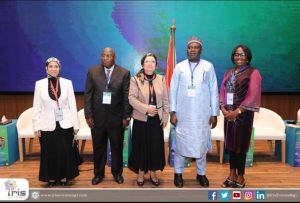PAS participated in the African Institute of Public Health Professional Conference in Cairo, Egypt, from the 22nd to 27th of November 2022 at the Ain Shams University Cairo and Galala University, Egypt. PAS shared best practices on advocacy for health financing through a paper presentation titled: Budget and Healthcare Financing and Performance of Key Maternal and Reproductive Health Indicators in 4 Nigerian States: Implications for Policy Advocacy.
The conference seeks to bring together stakeholders in public health in Africa and worldwide to share new knowledge in public health, disseminate research findings, and join publications. It will also bring experts from academia, research, governments, and public and private sectors to discuss the theme HEALTH EQUITY: A ROAD MAP TO UNIVERSAL HEALTH COVERAGE (UHC) and thereby contribute to achieving Sustainable Development Goals (SDGs)
PAS discusses a position paper on Budget and Healthcare Financing and the Performance of Key Maternal and Reproductive Health Indicators in 4 Nigerian States: Implications for Policy Advocacy. The north-western part of Nigeria has the lowest maternal health services utilization according to the Nigeria Demographic and Health Survey (2013 and 2018), with only about 34% of the women attending antenatal care clinics (ANC) and less than 10% delivering at the hospital or under a skilled birth attendant. Several factors militate against the utilization and uptake of maternal health services in northern Nigeria, thus leading to increased risks of maternal deaths. Past work on National Health Account estimation in 1998 -2002 revealed that the bulk of health funding is borne by households, making out-of-pocket payments for health care regressive. Household expenditure as a proportion of the Total Health Expenditure (THE) varied between the least value of 60.35% recorded in 2000 and the highest value of 69.21% in 1999, with a mean of 64.59% over the period (Soyibo, 2004). This has implications for accessing and scaling up maternal and child health services across the country (FMOH, 2007). It is noteworthy that the Federal budgetary component of the health expenditure increased marginally from 1999 actual spending of N16 billion (1.7% of the federal budget) to N63.2 billion (6.4%) in the 2002 actual expenditures (CBN, 2004). cairo2022 – AIPHP
Outcome – participants and the conference officials were recommended for further publication.


